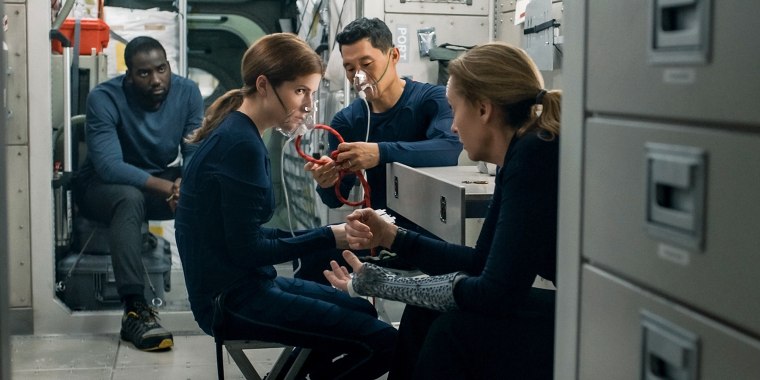Much of the world has spent more than a year in some form of isolation and lockdown. Ours may not have involved dehydrated meals and complete confinement in a small vehicle hurtling toward Mars surrounded by the vacuum of space, but there were times when life felt a little cold and empty. "Stowaway," which premiered on Netflix on Thursday, then, probably would have felt fresher — and less unsettling — before all of us had our own isolated pod experiences, complete with the desire to shove someone out an airlock.
The story is simple: Three people on a mission to Mars — commander Marina Barnett (Toni Collette), phycologist David Kim (Daniel Dae Kim) and doctor Zoe Levenson (Anna Kendrick) — discover a stowaway (Shamier Anderson) and have to deal with the consequences of his presence. Because this is a space movie, that naturally means the crew must make difficult decisions to save the mission.
There are many moments when "Stowaway" feels like a smaller, quieter, more downbeat companion to 2015’s "The Martian." Some of that is likely because the story attempts to stick as closely to scientific reality as possible (YouTuber Scott Manley consulted on the film’s science and math) and reality is reality. But part of it is also because "Stowaway" just doesn’t offer any possibility for a happy ending. It is a classic, philosophy 101 dilemma put on film: If you have to sacrifice one for the benefit of the group, how do you decide who?
I’d be lying if I said I wasn’t disappointed when I realized the titular stowaway was not an alien creature or even a deadly bacteria.
"Stowaway," then, is essentially "Lifeboat," the 1944 Alfred Hitchcock thriller, set in space and drained of any real conflict or suspense. The character archetypes — seasoned commander, dedicated scientist, plucky idealist, nice guy way out of his depth — have the self-control one would want in a crisis, but they’re also too shallowly drawn to give much weight to their debates.
Before things get really dire, the cast does have a relaxed chemistry that made me think they could have made it through a two-year mission without descending into space madness and re-enacting scenes from "Event Horizon." (Daniel Dae Kim also deserves a special mention for being the only actor in the history of movies to have a scene in which he talks about jazz that didn’t make me immediately hate his character.)
But watching the team then confront cascading disasters and increasingly dire possibilities, it all fell apart.
Space exploration can be exciting — NASA’s Perseverance rover landed on Mars in February, and the mission just conducted its first helicopter flight on the planet — but the real work of solving problems happens in research and careful calculation, not targeted nuclear bombs or giant drill ships aimed at the Earth’s core, neither of which is inherently cinematic. It’s possible to make an exciting movie about that process: The Apollo 13 mission and rescue still sounds too far-fetched to be possible today, let alone more than 50 years ago, and that movie is a modern classic.
"Stowaway," then, probably would have felt fresher before all of us had our own isolated pod experiences, complete with the desire to shove someone out an airlock.
Not every movie has to be a silly, escapist spectacle on the scale of "Godzilla vs. Kong," but I’d be lying if I said I wasn’t disappointed when I realized the titular stowaway was not an alien creature or even a deadly bacteria. It was comforting to watch disaster movies in the early days of Covid-19. At a time when all anyone could do was stay inside and avoid other people, there was a perverse thrill to films like "28 Days Later," "Train to Busan" or even "Contagion." At least in a cinematic apocalypse, things are out of our control.
But the idea of another person being the source of your own personal hell feels a little strange after having to give up almost all other people for a year.
We’ve been living through a time that has required most of us to make at least some sacrifices — some of them huge — to help and even save the lives of others. As more people get vaccinated and start to interact again, those calculations will change, but there will still be hard decisions ahead. After spending so much time wondering if a trip to the store could kill someone’s grandmother, the fates of a few fictional characters just don’t carry as much weight as they might have before we all had to make choices like that.
This is true even if Daniel Dae Kim's grief at losing his microgreens did make me tear up; I'm a terrible plant mom, too.



